People always talk about Chinese being a hard language to learn, but learning languages is always hard, right? Chinese characters look especially difficult, but is that the only thing that’s difficult? Is Chinese really the hardest language in the world to learn?
What exactly makes a language hard or easy to learn? As a typical native English speaker I found that there were elements of the Chinese language that were incredibly simple and there were other elements that were crazy difficult.
I’ll list these elements out and explain them here:
Summary
Is Chinese Hard to Learn?
- Some aspects of Chinese, such as grammar and pronunciation of Pinyin, are easy to learn.
- Other aspects, such as the vocabulary, characters, and tone pronunciation are hard to learn.
- Whether Chinese is easy or hard depends to a great extent what languages the learner has already mastered.
Table of Contents
- Reading and writing Chinese characters
- Pronunciation of characters
- Parts of Chinese grammar
- Speaking Chinese with tones
- Totally different set of vocabulary from English
- Large numbers
So is Chinese the hardest to learn?
Whether a language is hard or easy depends on the learner’s background
Chinese is Easy to Learn!
Surprise! There’s a lot about Mandarin Chinese that is easy to learn. So let’s dig right in.
Is Chinese Grammar Easy?
It’s said that Chinese has no grammar. But that’s silly. Every language has grammar. Nevertheless, Chinese grammar can be pretty simple compared to some others.
Chinese has no word form changes (morphology) like English does — for example “go” and “went.” English is also relatively simple in this regard compared to Spanish or Greek for example, whose verb conjugations exist apparently only to discourage American high school students and prevent them from attaining the A honor roll. (To see all of the verb conjugations of the Spanish “hablar” [to talk] read this and weep. )
Chinese on the other hand has only one word form. As you can see in the table below from first person singular to third person plural, the word form is exactly the same. And for past tense in Chinese, you simply add the particle “了.”

Further, the sentence word order is fairly similar to English. There’s none of that “flipping the sentence around” shenanigans that Japanese is known for.
The first Chinese sentence in the image below has the same order as the English sentence.
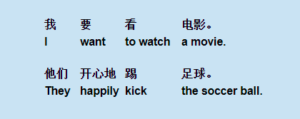
The second sentence shows that some sentences can be a little different from English since English would usually be, “They kick the soccer ball happily.” But still, most Chinese sentences follow a rule and can be constructed easily. According to East Asia Student the sentence order goes like this:
Sbj + Tme + Mnr + Plc + Neg + Aux + Vrb + Cmp + Obj
(subject, adverbials [time, manner, place], negative, auxiliary verb, verb, complement, object)
True, some Chinese sentence structures can be a little more challenging, but relatively speaking, it’s pretty easy.
Specialized Vocabulary Makes Sense in Chinese
Many English words come from French, Latin, or Greek roots. Since most Americans haven’t learned those languages, sometimes the meanings of those words are quite opaque.
For example, I was always curious about the Chinese name of folic acid, 叶酸, which translates as “leaf sour.” I wondered about it for years until suddenly I realized that “folic” refers to leaves. So basically the English and Chinese names of folic acid have the same meaning, but the Chinese name is based on normal characters with clear meanings, whereas the English name is based on Latin.
Many modern words also have a very obvious meaning. Telephone is 电话 or “electric speech.” Computer is 电脑 or “electric brain.”
This principle doesn’t always hold true. There are plenty of obscure Chinese words, but I often run into complex or scientific English words that seem to make more sense in Chinese.

A Chinese street in the evening.
Small Numbers in Chinese Are Easy
Expressing small numbers in Mandarin (under 10,000 [see the section below on big numbers]) is simpler than in English. There are characters to express one through ten and then these are used together in a simple and logical way to express all numbers. Rather than explaining, see the table below.
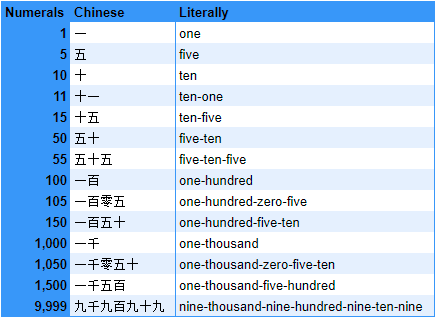
There are a few rules having to do with zero that might take a little effort to memorize, but other than that, small numbers are easy as pi.
Listening Is Listening
Probably part of the reason people say Mandarin is hard to learn is that they see the characters and think they are almost impossible to master.
But listening to Chinese excludes the written component, so listening comprehension in Chinese shouldn’t be too much more difficult than in any other language.
Pronunciation With Pinyin
Many years ago the government of China commissioned Zhou Youguang to invent a Romanization system for Chinese. A Romanization system is a system to convey the pronunciation of Chinese characters in Latin letters. The result is the Pinyin system.
Some of the letter combinations that Zhou chose to convey certain sounds are a little bewildering. However, unlike the pronunciation of English written words, Pinyin is consistent. After you learn the rules, you will always be able to pronounce words properly when you read them in Pinyin.
So that’s one way that Mandarin is easier than English!
Pinyin makes it easier to look up words in a dictionary and type Chinese characters on a computer. See the GIF below showing how most people type Chinese characters into the computer using Pinyin. For more information on Pinyin, see our article on the topic.

How to type Chinese characters using Pinyin.
So those are some aspects of learning Chinese that are not too difficult. What about the hard parts of Chinese?
Chinese Is Too Difficult to Learn!
I knew a brilliant and eccentric Russian linguist in living in China who spoke or read more than a dozen languages, including languages from former Soviet regions, German, English, Esperanto, Ancient Greek, Hebrew, Latin, and three types of Hieroglyphics.
As we enjoyed a delicious meal one winter in Northern China, I asked him, “Are you learning Chinese?”
“No!” he scoffed. “Chinese is too difficult!”
So what makes it difficult?
Chinese Characters Test Your Memory
In order to read a newspaper, you need to be able to read around 3,000 characters. There’s only one way to learn that many characters—STUDY.
This is the dragon of Chinese language learning that scares off the most people.

It’s estimated that reading a Chinese newspaper requires knowledge of around 3,000 characters.
But it’s not as bad as you might think. It’s not like there are thousands of completely different Chinese characters with no similarities.
Instead, Chinese characters are made up of radicals, and there are around 214 radicals in the Chinese language.
Chinese radicals are nothing like letters, but let’s compare them to letters just as a metaphor. In English once you learn the 26 letters of the alphabet, you can write any word. Well, in Chinese once you learn the 214 radicals, you can write any character.
The characters are also much easier to learn once you know the radicals because when you learn a new character, you can just memorize what radicals it contains and in what position they are situated. . . . Ok, so it doesn’t make it THAT easy, but it’s still easier than if you had to memorize every character as a completely unique collection of scribbles.
For example, 木 means “tree.” It is also a radical that is found in many characters. For example, 柠,权,杨,板,架,柔,柯,桂,棒, and many, many more.
Can you guess what 森林 means?
It means . . . “forest”!

The Great Wall in a 森林 (see above for the meaning of this word).
During one of my first Chinese classes as a beginner, the teacher wrote a phrase on the board in characters I had never seen before. She let us look at them for one minute. Then she erased the phrase and asked us to write it.
I had already learned the radicals on my own, so I wrote all of the characters from memory (but in the wrong order). The classmates were astounded, but that’s only because they hadn’t studied the radicals yet.
So learn the radicals, and the characters won’t be as hard as they look.
Still, characters remain a challenge even for locals. Over the years, I’ve seen some Chinese style spelling mistakes.
Below is a sign painted in front of a small hotel. It should say “旅店” but instead it looks like it says 方氏店. (The error is in the character on top — “旅.” Can you see the difference?)
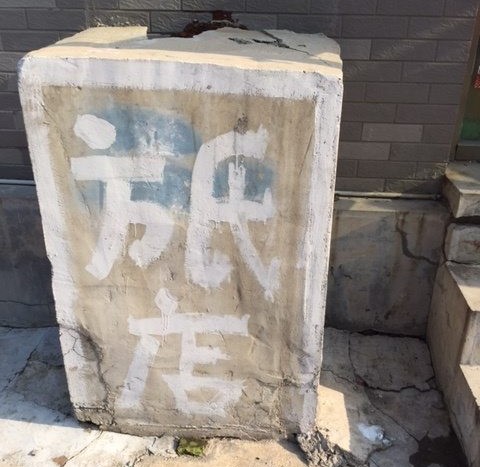
The characters of the Chinese language make it one of the hardest languages in the world to learn, but they also are one of the most beautiful and charming aspects of the Chinese language. In fact, the beauty of the written language was one of the reasons I started studying it years ago.
Pronunciation of Chinese Characters
A great thing about English is that generally when you see a new word you can sound it out. There are words that have strange pronunciations (light, victuals, though, through, thorough, etc.), but generally you can figure out the basic pronunciation.
However, Chinese characters are not phonetic. When you see a new word, you have to look it up in the dictionary to find the Pinyin pronunciation guide. (“How do you look it up in the dictionary when you don’t know how to pronounce it?” you ask. It’s possible.)
Often you can make a guess about the pronunciation of a Chinese character based on how it looks. For example, 拧,柠,and 咛 all have the character 宁 in them, and they are all pronounced “ning.”
But you can only make a guess. It does not always work. The characters 并 and 饼 are both pronounced “bing,” but the characters 瓶,屏,and 帡 are all pronounced “ping.”
That means that you basically need to memorize the pronunciation for every character you learn.
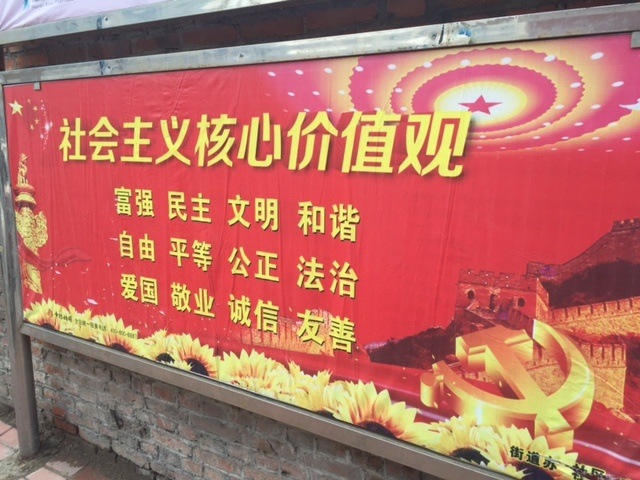
A sign in China extolling the twelve core values of socialism
Is Chinese Grammar Hard?
Chinese grammar is generally pretty easy, but there are a few elements that are a little challenging.
There are many different measurement words you use when numbering items. In English we would say “one dog” but in Chinese you must add a measure word between the number and the noun, so it would be “一条狗.” “条” is the measure word here. You always need to use the right measure word for the right noun.
Here are some examples of Chinese measure words:
- Flat things like tables and papers: 张
- Round things like eggs, beans, and stars: 颗
- Pairs like shoes and pants: 双
- Some animals like chickens: 只
- Some other animals like dogs and fish: 条
- Long objects like roads and rivers: 条 (That’s right. It’s the same character as above. Don’t ask me.)

Can anyone advise the author on why dog and river have the same measure word in Chinese?
For a longer list of measure words and how to use them see this site.
Another thing that can be difficult is saying “yes” and “no.” There are a few different words that mean “no,” and you need to learn the rules for when to use them.
But saying “yes” in Chinese can be even more complicated. There ARE several words that mean yes, but often to say “yes” in Chinese, you just repeat the main verb of the question. For example, if someone asks in Chinese, “Did you eat?”, then your answer would be “ate” not “yes.”
So in Chinese if you didn’t hear the verb clearly, unlike with English, you can’t just pretend that you understood the question, nod your head, smile, and say “Yes, yes, yes.”
During my first winter living in China, I walked into a shop. An overeager salesperson bounced over to me and said something like, “Look at this beautiful scarf! Do you want to try it on?!!”
Bewildered, I had no idea what she said to me, so I stammered the last syllable I heard her say, which must have been “try.” To my surprise in less than an instant, she had wrapped the scarf around my neck.
I still have that . . .
Speaking—What Are Chinese Tones?
In Chinese all words have tones. The tone is part of the word, so if you say the tone wrong, you might say a different word.
There are 4 tones and a neutral tone. The first tone is high (like singing). The second one goes up (like an English question). The third goes down and back up a little (like . . . I’m not sure what to compare this to). The fourth tone goes down sharply (like you’re cussing [and you may feel like cussing after trying to learn the tones]). Finally, the neutral tone is a little bit like an English unstressed syllable.
The classic example used for teaching tones is the sound “ma.” Here’s a table showing the tones and the meanings.
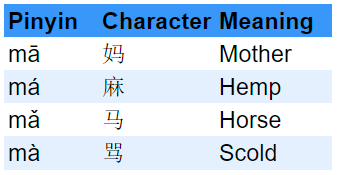
To make it worse, a character’s tones can change in the context of a word or sentence.
If you want to learn the basics about tones, see this YouTube video or you can click on the pinyin in this chart to hear the sound in the various tones.
If you are a native English speaker, tones will definitely keep you busy with your studies. In fact, “foreigners” are famous in China for having bad tones. In one popular Chinese skit, a character introduces himself as “Xiao Shenyang.” Then he says that his English name is “Xiao Shenyang” except he says it in exaggerated wavering incorrect tones.
A great punchline! Silly foreigners.
Chinese Vocabulary Is Nothing Like English
The reason the vocabulary is difficult is that Chinese and English have few words in common and very few words have roots in the other language.
With Spanish there are many words such as “agua” and “amor” with which English speakers would be familiar due to their similarity to English words.
But with Chinese there aren’t many words like that. Other than “kungfu” and “lomein,” I can’t think of many other English words that come from Chinese. And other than 麦克风 (maikefeng), which means “microphone,” I can’t think of too many Chinese words that come from English.
Big Numbers in Chinese Are Confusing
As mentioned above, learning small numbers in Chinese is quite easy, but for numbers bigger than 9,999, it can be difficult to keep things straight.
That’s because English uses the word “thousand” to refer to numbers that have from four to six digits (1,000-999,999), but Chinese uses the word “千” (qian) only for numbers that have four digits (1,000-9,999).
For numbers with five to eight digits (10,000-99,999,999), Chinese uses the word “万” (wan).
Here’s a table of Chinese numbers showing how the Chinese numbering system differs from English.
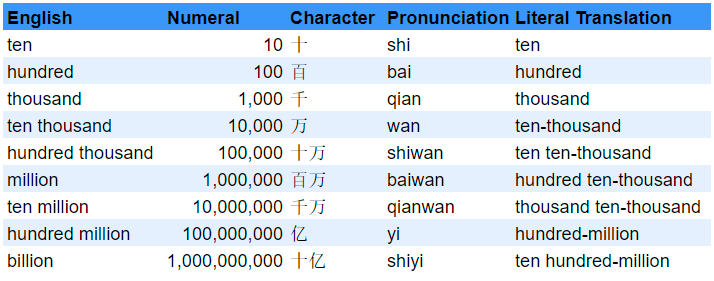
This difference between the languages makes it difficult to translate from one language to the other. It’s also difficult because although the commas we put in the numerals match nicely with the number words in English (thousand, million, billion), that’s not the case with Chinese.
Every time I say a large number in Chinese I have to stop and think about it.
For a more complete explanation of this difficulty, see my article A Translation Quirk That Could Cost You $90,000.
Is Chinese the Hardest Language in the World to Learn?
So those are some easy aspects and some hard aspects of learning Chinese, but how hard is it to learn Mandarin compared to other languages?
If you do a quick web search for a list of the hardest languages, you will find that the lists are all different, but Chinese is on almost all of the lists and it’s almost always one of the top five.
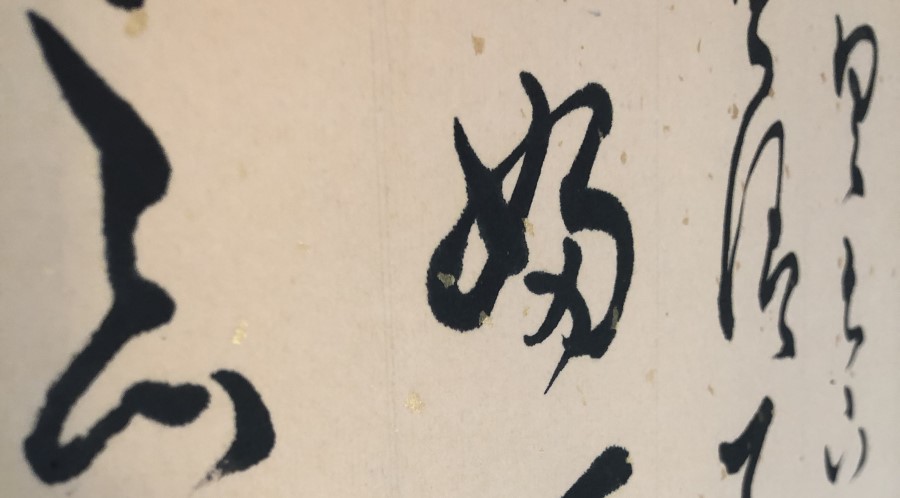
Chinese characters attract some learners with their beauty and frighten off others with their complexity.
The U.S. Foreign Service created a list of the hardest to easiest languages to learn measured by the number of hours of study required for a native English speaker to gain proficiency. The easiest languages take about 24 weeks or 600 hours to learn. The hardest languages, however — Arabic, Chinese, Japanese, and Korean — take about 1.7 years or 2,200 hours to learn.
Whether It’s Difficult Depends on Who You Are
So is Chinese hard to learn? There are parts of Chinese that could be considered objectively more difficult than other languages. For example, it’s MUCH more difficult to learn the 3,000 characters necessary to read a Chinese newspaper than it is to learn the 26 letters in the English alphabet.
But whether Chinese is difficult for you to learn can depend on what languages you already know.
Languages have a number of similarities and differences with each other, so if you are a native speaker of a language that is very similar to Chinese, then Chinese should be easier to learn.
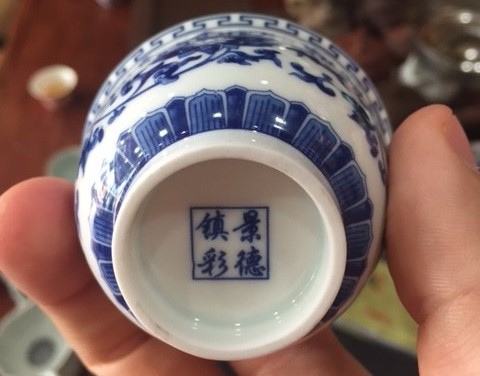
A teacup with Chinese characters on the bottom
Some elements that might be similar or different between various languages include the writing system, grammar (including word order and morphology), vocabulary, use of tones in speech, pronunciation, and so on.
So for example, if you are Japanese, it should be much easier to learn to read and write Chinese than if you read only English. Likewise, if you speak a tonal language like Vietnamese, it should be easier for you to learn to voice Chinese tones correctly than if you speak only English.
So according to my experience learning Chinese, did it feel like I was learning the hardest language in the world? Well, there were difficulties, but I love the Chinese language.
If you are doing something you love, it might still be hard, but it is rewarding and enjoyable.
Like the Article?
To share with everyone on Twitter, click here >>> Tweet
To follow IVANNOVATION and see our posts, click here >>> Follow @IVANNOVATION
Darren Jansen, business development and content manager for IVANNOVATION, has a lifetime love for tech and languages. At IVANNOVATION he helps software developers get professional localization for their apps, software, and websites. On his time away from the office, he can be found hiking the Carolina wilderness or reading Chinese literature.
Get free translation tips straight to your inbox!
- Get tips on how to translate your website, marketing materials!
- Get actionable advice to help you succeed with international business.
- Be the first to access free language and management tools.



Is Chinese difficult to learn? Many English speakers certainly find it tough. In fact, Mandarin is one of the trickiest languages for English speakers to pick up as a result of its tonal nature and complex script.
A lack of learning resources also used to be an issue for many would-be Mandarin speakers. However, that has changed significantly in recent years, with a vast range of resources available online for those with an interest in learning Mandarin.
In the UK, Mandarin learning is increasing rapidly. Over 3,500 pupils undertook Mandarin Chinese GCSEs in 2018 and the British Council reports that Chinese is now offered as a GCSE option by 8% of state-run schools and 32% of independently run schools.
Read more: https://www.tomedes.com/translator-hub/hardest-languages-to-learn
Hi Paul, nice to hear from you again. Indeed, it’s much easier to learn now than it used to be. When our marketing director first moved to China he had only a paper dictionary to guide him. Now there are many electronic resources such as YouTube videos that can help along a student of Chinese.
This is a very nice one and gives in-depth information. I am really happy with the quality and presentation of the article. I’d really like to appreciate the efforts you get with writing this post. Thanks for sharing.
https://www.sevenmentor.com/japanese-classes-in-pune.php
Looks like you work with a Japanese training school in India. Is Japanese becoming a popular second language in India? I think Indian people are brilliant; I’ve never met an Indian who didn’t speak at least 3 different languages with 2-3 different writing systems!
What do you think: Do you think Japanese is harder than Chinese? Japanese has Katakana, Hiragana, and Kanji, plus an interesting grammar from what I’ve heard.
Thanks! A great article with really good advice. Learning Chinese is really not the easiest thing. But believe me, it’s worth it. The Chinese language is very diverse and interesting. You can trust me. Since it’s not the first year I’ve been teaching Chinese lessons online and running my own blog. By the way, it helps me to shoot a video https://www.movavi.com/learning-portal/best-free-mp4-editors.html . Since this application is very convenient to use and does not require a lot of experience.
Very comprehensive. Chinese tone pronunciation may be the most difficult part when learning.
I usually use some screen and audio recorder like DemoCreator to practice my pronunciation- https://democreator.wondershare.com/
to record my pronunciation, mark the mistake and correct it. You can try to study Chinese with it.
This is a great blog. A very useful Blog for Chinese learners. Lots of interesting resources for listening, reading and grammar.Thanks for sharing
Visit Website: https://www.meiyuchinese.com/
Very thoughtful piece on Chinese language. Chinese a lot easier than most people think. Like all languages depends on how much effort and practice you put in.
So informative. Thank you for sharing
As you can say in this article that learning languages is always hard, but if we’ll practice to learn Chinese language day by day then we will definitely grab the skills to learn any kind of language. But it’s totally depends on your mindset. If you are ready to grab any skills, then go ahead!!!
emm…, unknown characters also have its way to be found in the dictionary.It is by BU
SHOU .Trust me, I am local.
True. There’s a link to an article about how to look up unknown characters by using radicals in the article above. “How do you look it up in the dictionary when you don’t know how to pronounce it?”
I really loved reading your blog. It was very well authored and easy to undertand.
You exactly pointed out that writing and reading Chinese characters and vocabulary, unsimplified in Taiwan, and memorizing their pronunciations and variants is the most difficult part in learning Mandarin even for local elementary school kids, which takes years to master. This is even more difficult for me as a Taiwanese to speak local languages sufficiently fluent to communicate, such as Taiwanese Hokkien, which has 7 tones, more complex tone-changing (tone sandhi) rules, different set of vocabulary and syntax, to name a few, from Mandarin.
Wow, Hokkien sounds even harder!
I really loved reading your blog. It was very well authored and easy to understand.
Learning languages can be challenging, but consistent daily practice in learning Chinese can equip us with the skills needed to tackle any language. Success largely depends on your mindset. If you’re prepared to acquire new skills, take the plunge and go for it!
That’s true!
Very infomative sharing. For beginners the most challenging but the important part should be master mandarin pinyin pronunciation. Luckily there is only 400+ pinyin units in Chinese, will come to 1400+ if calculating the tones difference. Here is a effective learning tool- live pinyin chart with audio https://chinesevoyage.org/mandarin-chinese-learning-tools-pronunciation-lesson-pinyin-chart-with-audio/ Very helpful when doing self-study.